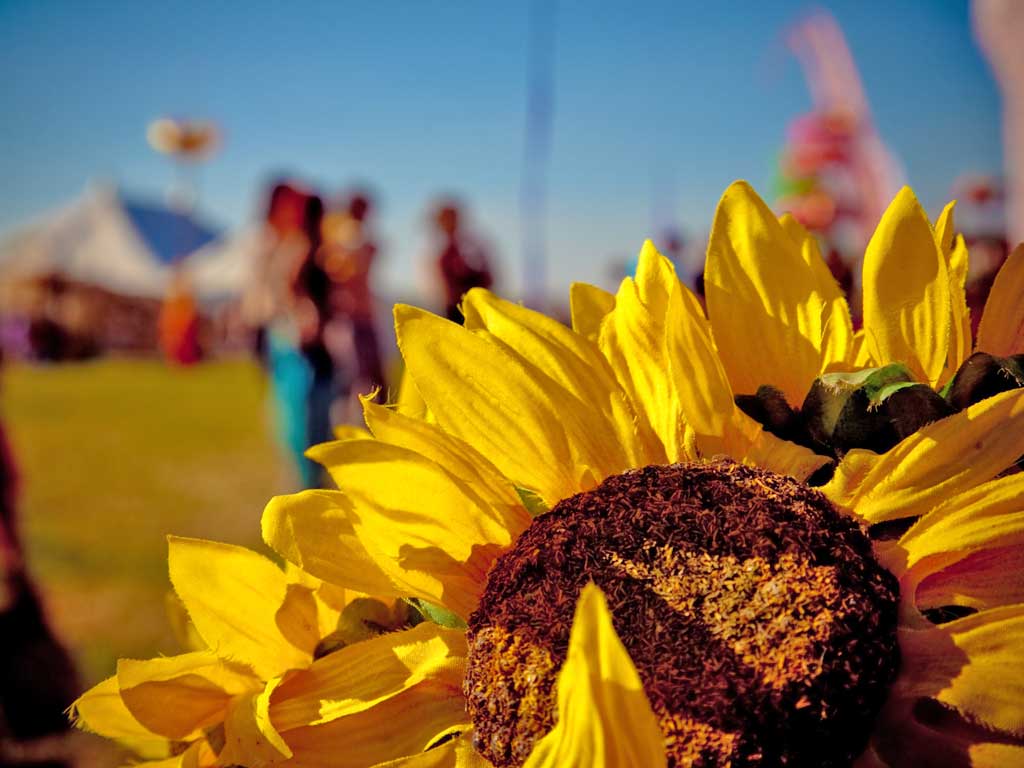How festival land turned green
UK event organisers are leading the way in terms of staging eco-friendly events, and have hatched some inspired ideas

“We could have saved the Earth but we were too damned cheap,” wrote author Kurt Vonnegut in Slaughterhouse-Five.
Well, there are a raft of music festivals trying their level, eco-friendly best to not "cheapen" or wreck our planet, most notably the Sunrise Celebration festival, which is the UK's leading sustainable event of its kind. Powered by 100 per cent sustainable energy, the gathering has been leading the way in innovative green technology since its inception seven years ago.
"The long-term vision of Sunrise is to have a farm and have a year-round eco centre," says Sunrise organiser Katherine Ritchie, who lives with the festival's creative director, Jake Ewen, in a small community outside Glastonbury. "We power everything with solar, live in a caravan and a cabin we built," she says. "And we collect our water from a spring."
In fact, a third of the core Sunrise team and a lot of the people who put on the music festival live off-grid. "So Sunrise isn't greenwash and that's what makes it different to the others," emphasises Ritchie. "Sunrise is powered on 100 per cent renewable energy, from solar, wind and bio diesel from recycled vegetable oil," she adds.
Sunrise are also the only large festival with site-wide compost toilets; they have a strict 80 per cent organic policy on all food and drink sold at the event; and they have comprehensive policies across the festival including a full disposable nappy programme, a UK first.
"We're working with Green Bottom to ensure that all nappy waste, as well as other sanitary products, are taken to a depot for turning into products such as roofing tiles," says Ritchie. "We expect it to reduce landfill waste by around 500kgs to one tonne over the festival."
However, hearteningly, Sunrise isn't alone as many of the slightly smaller, less corporate festivals are striving to be as green and ethical as possible; embracing the tree-hugging values of the original UK music festivals. For instance, Standon Calling is run 100 per cent on biodiesel, has composting loos and full waste recycling. All the packaging and containers from the caterers is made from special biogradeable material, and they offer reusable cups at all the bars with a 50p deposit, which helps avoids waste.
Then there's Northamptonshire's Shambala, which snaffled the Greener Festival gong at the UK Festival Awards last year, alongside numerous green awards over the past few months and years. "It's 100 per cent carbon neutral," says the event's organiser Chris Johnson. "We're 98 per cent powered by wind, sun and waste veg oil and we ensure free range, local and good quality food is served on site." Shambala, which is completely free from any kind of sponsorship branding, also emphasise that they subsidise coach travel as part of their sustainable transport strategy. Last year, 72 per cent of festivalgoers arrived in cars, 11 per cent came by coaches and an impressive 17 per cent arrived on the free biofuel shuttle bus, which is provided from the local train station.
The question of travel and carbon dioxide emission is an important one that many festivals are trying to desperately to embrace. Kent's Hop Farm festival, which has the ethos of "no sponsorship, no branding, no VIPs", have teamed up with the Big Green Coach company to ferry festivalgoers to the site.
Suffolk's Latitude, meanwhile, is promoting Tour de Latitude – a charity cycle trip to the site. Camp Bestival also has a charity ride – Bike to Bestival – which will take in a section of the London 2012 Olympic Road Race route before winding its way to the Isle of Wight. Lleucu Siencyn, chief executive of Literature Wales and an organiser for Wales' wildly diverse Dinefwr literature and music festival, expects "many festivalgoers from the local area to make their way down the sweeping driveway that leads up to the festival on foot, bicycle or maybe even on their roller skates."
Everywhere you look festivals are endeavouring to be more eco-friendly. For instance, No Direction Home, the new three-dayer established by the End of the Road organisers and set in the beautiful Welbeck Estate near Sheffield, have a few innovative ideas. "We're using low-energy technology such as lights with daylight sensors," says festival spokesman Seb Emina. "We have restrictions on fuel use, a good fair-trade policy and a company called Complete Wasters running our recycling who aim to get our landfill to just 30 per cent of waste."
"We also just pledged 20 trees to The festival's wood," Emina adds, "which is a great idea as in it's not an "offset scheme", but an actual, physical wild wood in Dunreggan, Scotland that festivals can donate to." So, in the words of CBeebies' lovely scientist Nina (Katrina Bryan), who is appearing alongside her Neurons at Cheltenham's Wychwood festival, it's time to "go eco": ditch the car, minimise your waste and, of course, enjoy the music...
Join our commenting forum
Join thought-provoking conversations, follow other Independent readers and see their replies
Comments
Bookmark popover
Removed from bookmarks